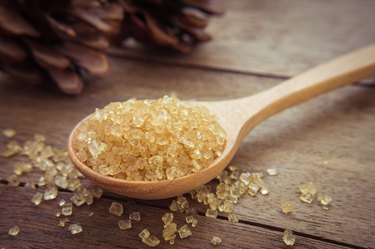
Muscovado sugar is often touted as a natural, unrefined alternative to brown sugar. It owes its strong flavor, high moisture content and ultra-dark color to molasses, the "impurity" that's stripped out of more refined sugars. Although molasses is the most nutritious part of the sugar cane plant, muscovado sugar isn't any healthier than standard table sugar.
Natural vs. Healthy
Video of the Day
Muscovado sugar is essentially evaporated cane juice that's been minimally clarified and then crystallized. It qualifies as "natural" and "unrefined" because each granule holds molasses, which is primarily what differentiates it from traditional sugar. While muscovado sugar does supply a few vitamins and minerals, the levels in an individual serving aren't high enough to be beneficial.
Video of the Day
Nutritional Equals
With about 15 calories and 4 grams of carbohydrates per teaspoon, muscovado sugar is nutritionally comparable to refined white sugar and brown sugar. Because it contains no dietary fiber, your body absorbs muscovado sugar exactly the same way it absorbs highly refined products. To get significant amounts of iron, potassium and magnesium -- the main nutrients in molasses -- from muscovado sugar, you'd have to eat large, unhealthy quantities of the stuff.
Influence on Health
Eating too much sugar can increase your risk of becoming overweight, developing Type 2 diabetes and dying from heart disease. The American Heart Association therefore advises men to consume less than 150 calories, or 9 teaspoons, of added sugar per day, and women to consume less than 100 calories, or 6 teaspoons, a day. Keep in mind this limit includes all types of added sugar, including sugar added to packaged foods, like flavored yogurt.